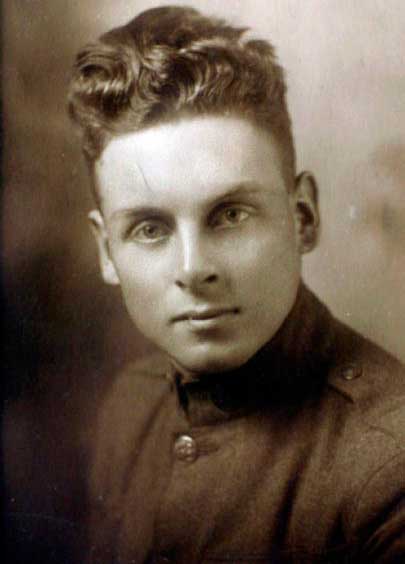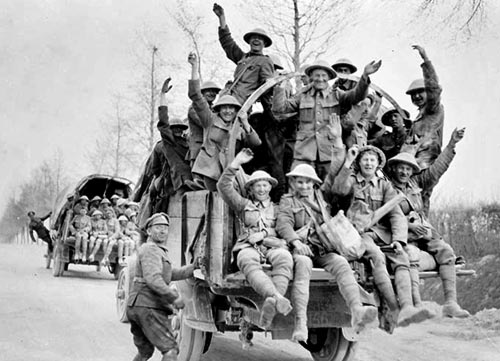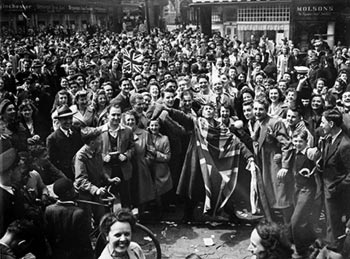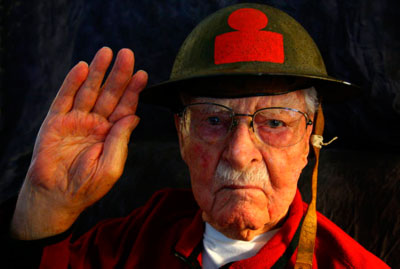Birth of a Nation, Death in the Family
John Babcock & The Lost Generation
by Glenn Warner
Street revelry and nationalistic fervour during the 2010 Vancouver Olympics caused much hand-rubbing by reporters who effused they'd never witnessed anything like it among Canadians. We're naturally inclined towards Presentism, of course, because that's where we live, but that euphoria has burbled several remarkable times in the national psyche.
 John Babcock in 1921, returned from WW1, now in US Army uniform. (Public Domain)
John Babcock in 1921, returned from WW1, now in US Army uniform. (Public Domain)Regrettably, the festivities made us overlook a significant death at the start of the Vancouver Olympics — no, not the tragic accident of the Georgian luger Nodar Kumaritashvili — but the death of a man originally from a farm in Holleford, Ontario, who happened to die the same day Canadians were wracked by Team Canada's second hockey game against Switzerland, which unthinkably went to a shootout.
With such distractions, we paid little regard to the death of an entire generation of Canadians when Jack Babcock died on 18 February 2010. For almost three years (since Dwight Wilson died in May 2007) Babcock was the sole living representative of the approximately 650,000 Canadians who joined the Canadian Expeditionary Force in The Great War 1914-1918. Like many Canadians of his generation, Jack too was swept up in the national fervour of his day.
Much has been made of the significance of the battle of Vimy Ridge to the Dominion of Canada. Indeed much of that 'birth of a nation' talk is revisionist, but the soldiers of the four Canadian divisions who took that escarpment after four days of fighting from 9 to 12 April 1917 certainly did know they'd done something exceptional, even if they didn't know at the time what that was. Fervour over the success at Vimy crackled, not on the homefront, but with the individual Canadian soldier serving in France and Belgium.

Jubilant Canadians in May 1917 after their success at Vimy Ridge.
(Photo by Ivor Castle, LAC, CO1405)
Canada's nationalistic tendencies may be latent for lengthy spans of time, but they reside there, just underneath the skin. The recent revelry in 2010 Vancouver resembled, for one, the Victory in Europe euphoria in May 1945 — Trafalgar Square, Toronto, Montreal, Halifax (well, the latter perhaps a little too exuberant).

VE Day Celebrations in Toronto, 8 May 1945.
(City of Toronto Archives)

VE Day Celebrations in Montreal, 8 May 1945.
(Montreal Star/LAC a152318)
Flash forward to Liberation Day celebrations in Apeldoorn, Netherlands in 1995. Or 2005. Or any year. Liberation Day ("Bevrijdingsdag" in Dutch) is May 5th, and that small country can throw a big party. And they happen to throw it for Canadians in a grand gesture of thanks. The recent Liberation Day (May 5th) and Victory-in-Europe Day (May 8th) celebrations in 2010 commemorated the 65th Anniversary of the defeat of Nazism. The number of Canadian veterans may be dwindling, but Dutch enthusiasm is not.
This web magazine ruminates on the historical zeitgeist of Canada, of which the leaf-waving at the Vancouver Olympics was just one in a legacy of defining moments. We hope to capture some of those moments here in this ever-expanding web-mag. Our primary focus is the Second World War, and we'll hear stories from Canadian veterans who, unlike our Great War vets, are still around to tell them.
Maple Leaf Up!

Jack Babcock (1900 - 2010) – Last of the Lost Generation.
(Photo by Brian J Gavriloff, Edmonton Journal)





